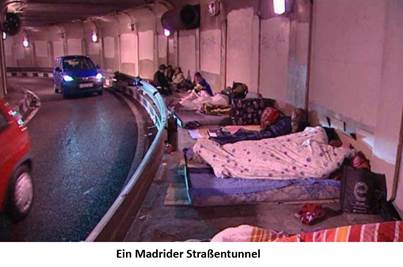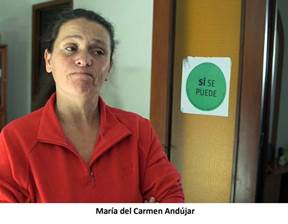Each day, more dedicated people contribute to the realization of the movie project „Who is saving whom?“. Some are donating money. Over 112.000€ have already been collected. Others translate interviews. Others again provide us with a place to live or informations on location. Our heartfelt thanks to all of you! The movie could not be made without you! Premiere will be in autumn 2014 – again in over 150 European cities at the same time, the exact date yet to be determined!
The last location the film brought us to was Spain. Here, more than anywhere else, is it becoming apparent that the bank rescue has been taken as a cause for making those who own nothing even poorer and especially take more of their rights away.
To become homeless overnight…
 In Spain, approximately three millions of apartments that are ready to move in remain empty. Nonetheless, each month around ten thousand families live through the trauma of eviction, mostly because they have lost their jobs and can't make their mortgage payments. Not only do they lose their apartments and end up on the streets if they lack family support. They also cannot get rid of their debt, even though they lose their apartments to the banks. On top of it, they owe the banks ten thousands of Euros of legal costs. To sneer at those which have no chance to escape the credit trap, the mayor of Madrid, has issued a decree, stating that spending the night on the streets of Madrid will be punished with a fine of 750€.
In Spain, approximately three millions of apartments that are ready to move in remain empty. Nonetheless, each month around ten thousand families live through the trauma of eviction, mostly because they have lost their jobs and can't make their mortgage payments. Not only do they lose their apartments and end up on the streets if they lack family support. They also cannot get rid of their debt, even though they lose their apartments to the banks. On top of it, they owe the banks ten thousands of Euros of legal costs. To sneer at those which have no chance to escape the credit trap, the mayor of Madrid, has issued a decree, stating that spending the night on the streets of Madrid will be punished with a fine of 750€.
In Andalusia, there are about 45 evictions daily. Also María del Carmen Andújar from Huelva at the southern Atlantic coast of Spain, her unemployed husband and the two teenage sons didn't have any hope. She earns a mere 420€ per month, the support of her husband, 400€ per month, expires in December. Like this, the family is certainly unable to make their mortgage payments. Recently, the savings bank sold their loan agreement to a speculation fund. And that one is merciless. The eviction was scheduled for early October. 
But then came the unexpected rescue.
The government of the autonomous region Andalucia – a coalition of the leftist party Izquerda Unida and the PSOE – wanted already in April to punish with a decree the vacantness of apartments with a fine of 9.000€ per square meter per month. Alternatively, evictions ought to be stopped. This draft bill was pocketed right away by the national government and passed on to the national court. In September, the government of Andalusia however passed the same law, slightly modified and untouchable. María del Carmen Andújar from Huelva was saved through the following instruction: When a family at risk of being evicted can prove that she has been unable to make the payments for the last three years due to poverty, the bank is expropriated as owner of the apartment for three years. During this time, the family has to pay only 25% of their income as low-income rent.
Summoned to Brussels – Democracy of bank rescue
But as soon as the new law was passed, the government of Andalusia was summoned to Brussels. The vice president of the European commission and commissioner for economic and monetary affairs, Olli Rehn, received the president of the automic government of Andalusia, Susana Díaz Pacheco, and her secretary for social welfare, Micaela Navarro with the accusation that the law would put the Spanish bad bank SARAB and the 100 Mrd. € of credit that Europe put to Spain's disposition, at risk. Since the Andalusian government representatives strictly refused to retract the law, the troika consisting of commission, central bank and IMF will assess to what extent the law is incompatible with the bank rescue, and thus the retraction can be enforced.
Opposition is the only chance of rescue
Meanwhile in other parts of Spain, evictions are happily continuing. The Committe of mortgage victims (PAH, Plataforma de afectados por la hipoteca) that emerged from the grassroots democracy movement 15M is increasingly successful to give evictions publicity. And usually, the eviction can be prevented with sufficient participation of the neighborhood and other activists. It is also helpful that upon request of PAH, the European Court of Justice declared the Spanish version of eviction where the debt remains, as illegal At the end of Oktober, the European Court of Justice prevented the expulsion of a of a group of evicted people from a row of houses. But most evictions do not happen publicly. And if it matters to the bank, hundreds of policemen break down massive opposition.
Model Germany
The 31 year old Amaya could not pay her rent from her meager salary as staff of the call center Konecta in Madrid On July 16 the first eviction was prevented thanks to great support. On September 11, a group of a hundred policemen appeared. Alaya suffered a psychological breakdown and got a sick certificate from a M.D. Immediately, the call-center sent her the note of termination. The enterprice acknowledges the medical certificate, however, it bases its decision on the new law of reforms of the labour market, which also allows people to be terminated during sick leave.
Actually, Spain only copied during its most recent labour market reforms exactly what is in force in Germany since Schröder: repetitive terminability, temporary employment, contract for services... The only thing that does not exist in Germany yet is the possibility of termination during sick leave. This is why Spain is considered more competitive ecomically.
On the island of the blissful
Evictions, only a problem in the southern debt-ridden countries? Far wrong! In Germany that is everyone's envy, this only works in a clandestine way. In Berlin about 22 times per day! In Hamburg there are 12 evictions every day!
Please help to stop this madness! Over 112.000 EURO have been collected for the movie „Who is saving whom?“ The goal of 130.000€ is not far now!








